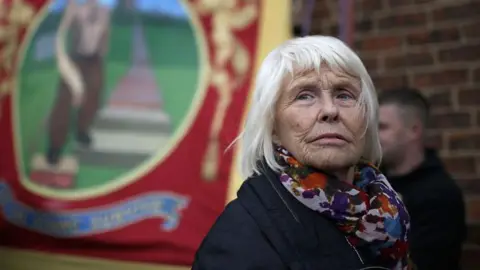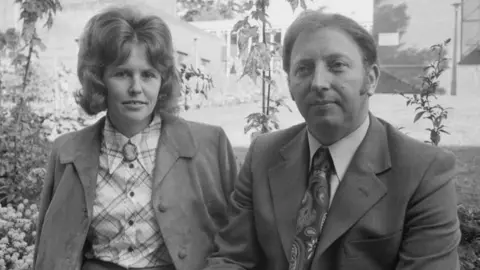Miners' strike campaigner Anne Scargill dies
 Getty Images
Getty ImagesAnne Scargill, the activist and campaigner who co-founded the national Women Against Pit Closures movement amid mass shutdowns in the 1980s, has died aged 83.
Ms Scargill had been living with dementia in a nursing home and died on Thursday, her friend and fellow activist Betty Cook said.
Born Anne Harper, Ms Scargill was married from 1961 until 2001 to Arthur Scargill, the trade unionist who led the 1984-85 miners' strike - and she said that dispute was her "political awakening".
Ms Cook, who worked with Ms Scargill for more than 40 years, paid tribute to her friend, saying: "What a woman she was. We will never see the likes of her again."
Ms Scargill was born in Barnsley in 1941, the daughter of a miner at Woolley Colliery, where her future husband also worked in later years.
She and Mr Scargill had a daughter, Margaret, in 1962 who became a GP and married a colliery manager.
Soon after the miners' strike began in 1984, Ms Scargill began to organise with women in her community, catering for people at the local welfare hall, travelling to cities like York to fundraise, and speaking at protests.
 Getty Images
Getty ImagesSpeaking to the BBC in 2018, Ms Scargill said: "I used to go to the meetings with my ex-husband [Mr Scargill] and I thought, 'oh, I couldn't stand up and speak like that'.
"And then we were getting letters from all over saying, 'come and speak here, come and speak there'.
"It changed a hell of a lot of women."
Ms Scargill said she believed then-Prime Minister Margaret Thatcher expected miners' wives to "make the men go back to work".
"She got a shock then, didn't she? She didn't realise we were fighting for our future," she said.
In the 2018 interview, Ms Scargill looked back on the first year of the strike with fondness, and said she did not regret "one minute" of what she had done.
"That Christmas was one of the best I've had in my life, because it were a community Christmas," she explained.
"I'm not saying it were easy - it were hard - but we thought, 'we'll show Thatcher. We're not giving in. We are women, we are strong, we are fighting for our rights'.'"
In her tribute to Ms Scargill, Ms Cook said: "I feel so alone when I go to different places where we normally would have been together."
The pair had been "arrested and locked up in the same cell, organised a picket line in India and narrowly missed being arrested fighting for the cotton workers", she said.
"We travelled the world together, and now you travel the heavenly skies. Love you, Anne."
Ian Clayton, who helped Ms Scargill and Ms Cook write their memoir called United by the Struggle, said Ms Scargill's "broad Yorkshire accent" was rarely captured in newspaper and magazine articles.
"A lot of what she had to say about trade unions and the women's movement, all that good stuff, she said in her own words," he said.
"She always said, '[the articles] are not catching my voice'.
"Whenever there was a picket line to be organised or a celebration of working class lives, she would be there.
"She was a church-going lady, a great socialist, and a very kind-hearted woman who gave a lot to charity."
Mr Clayton described Ms Scargill as a "working class warrior", adding: "I think she'd like to be remembered as a tough woman, who stood up for what she believed was right."
Listen to highlights from South Yorkshire on BBC Sounds, catch up with the latest episode of Look North
